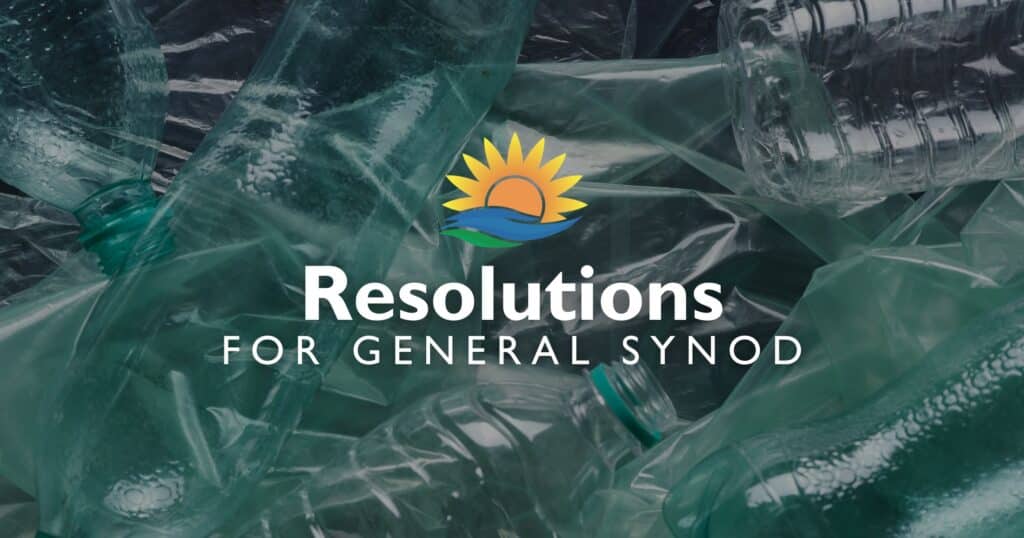Two Conferences call for Synod response to ‘plastic pandemic’
The 2023 General Synod of the United Church of Christ will consider 17 resolutions and several bylaw changes when it meets June 30-July 4 in Indianapolis. This is one in a series of articles about them. Full texts of each of the proposed resolutions are available at the General Synod website.
Decades ago, a commonly accepted idea sprung up that an environmentally conscious way to use plastic was to recycle it. But it turns out that only 9% of all plastic waste produced is recycled. The vast majority of it — 79% — is left to collect in landfills, oceans and ecosystems.
This growing “plastic pandemic” is something that two resolutions going before General Synod aim to curb.
Both propose for settings across the United Church of Christ to reduce plastic waste, with particular attention to cutting down on single-use plastics, and to advocate for policy that will reduce plastic production.
Reducing plastics “is a very important move towards making churches more sustainable,” said Zeph Marean, a 10th grader who is part of the New Hampshire Conference environmental justice team that helped develop these resolutions. “It also gets climate change and ways to help fight against it into the church’s perspective.”
This is a priority for Marean, who will also serve as a Synod delegate and present on these resolutions. She’s interested in environmental justice, most simply, she said, because she lives on the earth that is getting impacted. “I am scared of the effect that climate change is having, and will continue to have, on God’s creation.”
‘Shared spirit’
Two Resolutions of Witness with the same name, “Free from Plastic Pollution,” are planned for Synod — one from the New Hampshire Conference and the other from the Florida Conference. But much of the text in the resolutions is the same.
Having two distinct resolutions is a matter of logistics. The environmental justice teams of both Conferences worked together to draft one resolution. Some differences came about when it went to the respective Conferences’ annual gatherings in October 2022, where separate edits were made by each body. Because each Conference approved a different draft, both will go to Synod. They are scheduled to go to the same committee, where there is always the possibility of combining them into one, according to David Anderson, who serves as Synod staff.
Some initial differences are that the Florida resolution includes greater detail about the environmental justice and health impacts on marginalized communities and those living within proximity to production and waste sites. The New Hampshire resolution notes the need for accommodations for “certain impacted groups like those who are disabled or unhoused.”
“The spirit is really the same, and the implementation is the same that we are already working on together,” said the Rev. Bob Shore-Goss, who heads the Florida environmental justice team. “What the two resolutions indicate is that at least two Conferences feel very passionate about this — that we need to do something about the plastic pandemic and act upon it.
“There is momentum behind this.”
‘Addicted to plastic’
It’s easy to point to concrete instances of how plastics are interfering with the environment. The resolutions describe a plastic island in the Pacific Ocean that covers 800,000 square miles and how the number of plastics in the oceans is on pace to outnumber fish by 2050.
These break down into microplastics that get into the food chain, so that people and animals typically end up eating plastics with every meal.
“The more I read about it, the more uneasy I got about the number of plastic bottles used and not recycled,” said Shore-Goss. He felt inspired by a 2022 United Nations call for faith groups to work against plastic pollution.
“I took that as a challenge, and I think it’s a call to us because we’re incredible consumers of plastic — we’re addicted to plastic as a society. And it’s going to affect the health of people and nonhuman life, plants and animals,” he said. “The importance is there’s a call out there, and we are answering that call.”
‘A moral issue’
The resolution writers sought out partnerships with groups already doing work to reduce plastics, including Ten Towns and Beyond Plastics.
“We’re ahead of the game on implementation,” said the Rev. Robert Grabill, who heads the New Hampshire group. “We’re pretending that it’s already going to be approved, and we want it to be active and implemented in a number of ways.”
“This is so massive, we can’t do it without partnership,” said Shore-Goss. “The question is, how much can we implement it on a local level?”
Some churches, for instance, are installing water fountains that accommodate reusable water bottles. At Naples United Church of Christ, the congregation’s Environment Subcommittee invited its members to the spiritual practice of giving up single-use plastics for Lent.
The hope is to continue building a broader UCC movement.
“Passing this resolution would suggest an alliance with hundreds of churches who care about creation justice and can work both on the small stuff, like getting congregations to ban single-use plastics, and also get involved in the bigger stuff like witness in the public square,” Grabill said.
“Climate justice is a moral issue, and the church has the moral authority to speak to it in the public square.”
Content on ucc.org is copyrighted by the National Setting of the United Church of Christ and may be only shared according to the guidelines outlined here.
Related News
A Prophetic Call for Justice and Peace in Palestine
The executive leaders of the United Church of Christ have issued the following statement...
Read More‘Love is Greater Than Fear’: Regional Youth Events get to the heart of gospel message
United Church of Christ teens attending this summer’s Regional Youth Events (RYE) are...
Read MoreUCC desk calendars available to order now
Prepare for your day, month and year with the United Church of Christ desk calendar —...
Read More


